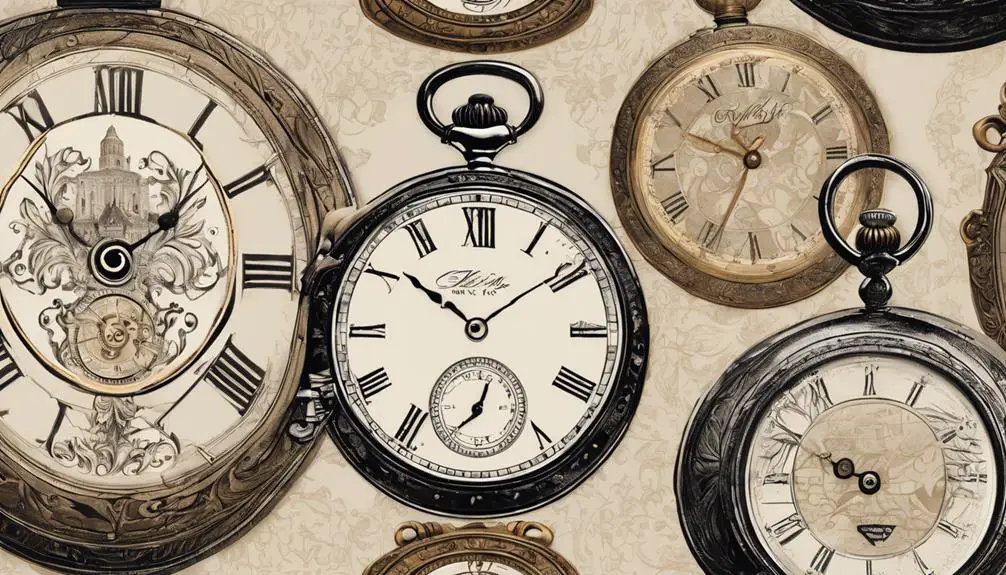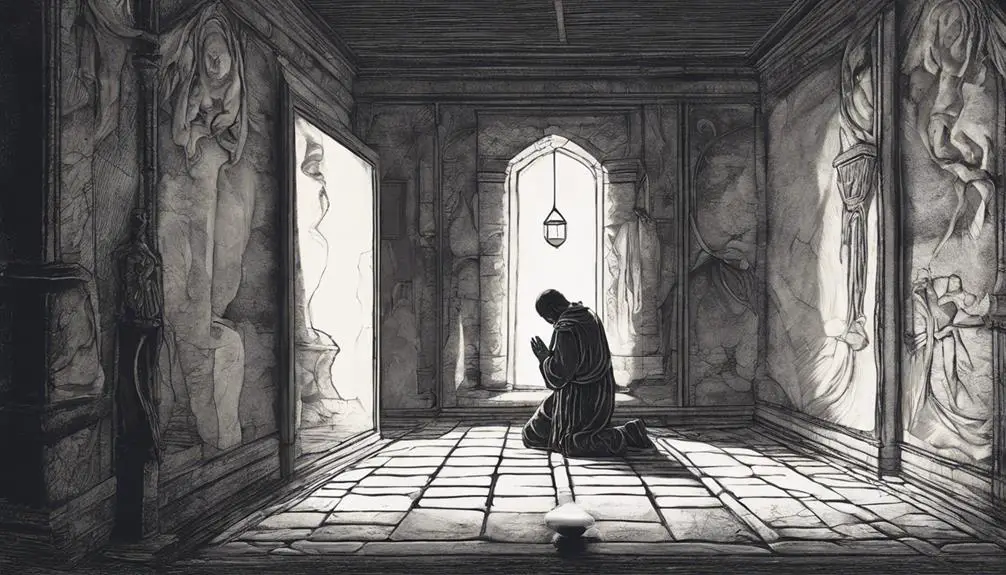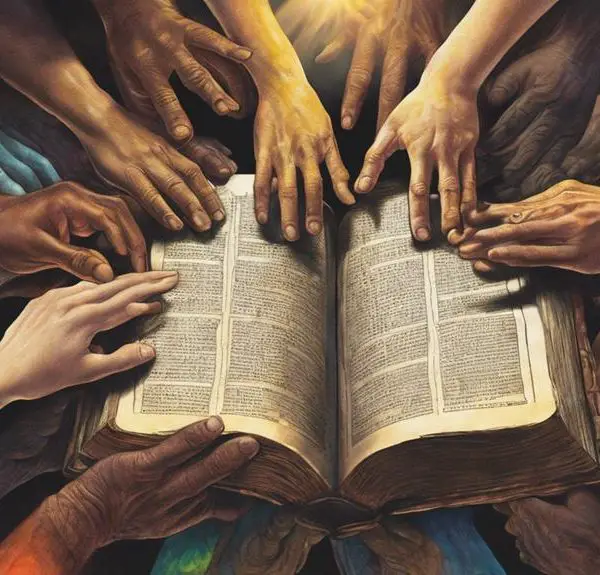Journey through the night with biblical prayer watches, uncovering ancient rhythms that could revolutionize your spiritual practice.

Prayer Watches in the Bible
In the Bible, Jesus asks his disciples to watch and pray with him for an hour during what is identified as the first watch of the night in the Garden of Gethsemane. This moment highlights the significance of prayer watches, a practice that divides the day into specific periods for focused prayer.
You're probably familiar with praying at different times of the day, but have you ever considered the deeper implications and historical roots of these specific intervals? Uncovering the meaning behind each prayer watch can transform your spiritual routine, offering fresh insights and a stronger connection to the biblical tradition of prayer.
Let's explore the significance behind these times and how they can enrich your prayer life.
Key Takeaways
- Prayer watches are biblically rooted traditions emphasizing designated times for spiritual engagement and vigilance.
- Each watch represents a specific period with unique spiritual significance, from evening gratitude to morning renewal.
- The practice encourages believers to connect with God through prayer at potent times for protection, guidance, and spiritual warfare.
- Embracing prayer watches enhances a believer's discipline, devotion, and awareness of God's presence throughout the day and night.
Understanding Prayer Watches

To understand prayer watches, it's essential to grasp their historical and biblical origins, which provide a framework for their significance in spiritual practice. These watches are deeply rooted in ancient traditions and scriptures, serving as designated times for prayer and vigilance. The concept originates from the historical practice of dividing the night into specific periods for watchful activities, including prayer, as a means of protection and communication with the divine.
The spiritual significance of this practice is profound, emphasizing the importance of vigilance, devotion, and communion with God. In biblical times, believers were encouraged to pray during these watches, believing that certain times were especially potent for spiritual activities. This tradition underscores a belief in the power of prayer to influence both the physical and spiritual realms.
The First Watch: Evening
The first watch, known as the Evening Watch, spans from 6:00 PM to 9:00 PM and serves as a critical period for initiating nightly prayers and reflections. This time frame holds profound historical context and cultural significance, deeply rooted in the traditions and practices of ancient societies referenced within biblical texts. Historically, the evening marked the transition from day's labor to night's rest, a natural moment for reflection and supplication.
In biblical times, the Evening Watch wasn't merely a passage of time but a designated period for deliberate spiritual engagement. It symbolized the end of daily toil and the beginning of a sacred space for communion with the divine. The cultural significance of this watch is evident in its recurring mention throughout scripture, where it's often associated with protection and preparation for the unknowns of the night ahead.
Analyzing the Evening Watch through a scholarly lens reveals its role as a cornerstone in the practice of prayer watches, emphasizing the importance of ending the day with gratitude, reflection, and seeking guidance. This watch's enduring relevance highlights its role in fostering a deep, introspective relationship with spirituality, setting a foundational tone for the watches that follow.
The Second Watch: Midnight

Following the Evening Watch, the Midnight Watch emerges as another significant period, extending from 9:00 PM to midnight, where scriptural narratives underscore its critical role in spiritual vigilance and prayer. This watch is traditionally associated with heightened spiritual activity, where believers are encouraged to engage in prayer against adversities and for divine intervention. The notion of midnight miracles, events of profound spiritual significance occurring during this time, is deeply embedded in the biblical tradition. These miracles often signify God's deliverance and the manifestation of His power during times of darkness.
The Midnight Watch is also a time characterized by intense spiritual warfare. It's a period where the faithful are called to stand guard, employing prayer as a weapon against the forces of darkness that seek to operate in the cover of night. Scripture presents this watch as a strategic time for intercession, where prayers can influence the spiritual realm significantly.
In analyzing the Midnight Watch, it's clear that the bible positions this time as pivotal for those seeking to deepen their spiritual practice through prayer. It's not merely about the time of night but about being alert and active in one's spiritual life, ready to engage in battle and witness midnight miracles unfold.
The Third Watch: Cockcrow
Transitioning into the early morning hours, we encounter the Third Watch, known as Cockcrow, a time deeply interwoven with themes of vigilance and renewal in biblical narratives. This period, typically spanning from around 3 AM to 6 AM, holds significant symbolism, particularly through the rooster's crow. The rooster's call not only marks the approach of dawn but also serves as a metaphorical reminder for the faithful to stay awake, both physically and spiritually.
The rooster symbolism in this watch is intricately linked to the notion of awakening. It's a call to prayer, reflection, and preparation for the new day. This symbolism is rooted in biblical stories and teachings that emphasize the importance of being vigilant and ready for the divine messages that may come at any moment.
Moreover, the Third Watch intersects with natural sleep patterns, occurring at a time when many are in the deepest phase of sleep. This juxtaposition of deep physical rest against the call to spiritual wakefulness offers a profound lesson on balance and readiness. It suggests that even in our most restful moments, there's an inherent need to remain attuned to spiritual responsibilities and revelations.
The Fourth Watch: Morning

Often overlooked, the Fourth Watch, spanning from 6 AM to 9 AM, signifies a time of awakening and the beginning of daily activities in biblical narratives. This period is not just about the literal rising of the sun, but also embodies a profound moment for spiritual awakening and divine encounters. As you delve into scripture, you'll find that this watch is pivotal for prayer, reflection, and seeking guidance for the day ahead.
Time of Day |
Significance |
|---|---|
6 AM |
Dawn of a new day, symbolizing new beginnings and fresh starts. |
7 AM |
Light fully breaks, representing clarity, revelation, and divine illumination. |
8 AM |
Day's activities commence, a time to pray for guidance and protection. |
9 AM |
Completion of the Fourth Watch, a moment to commit the day's work into divine hands. |
In this context, you are invited to consider your morning routine as more than just a start to your daily chores or work. It's a sacred time to connect with the divine, seek spiritual direction, and prepare yourself for the challenges and opportunities that lie ahead. This watch teaches that each day is a gift filled with potential for meaningful divine encounters.
Frequently Asked Questions
How Do Modern-Day Christians Integrate the Concept of Prayer Watches Into Their Daily Lives, Especially Considering Contemporary Work and Family Schedules?
You might wonder how to weave prayer watches into your hectic life. It's about digital adaptation and lifestyle integration. You'll find apps and reminders to pray at specific times, aligning with ancient practices.
This approach lets you honor traditional spiritual disciplines while juggling work and family. It's not about strict adherence to set times, but adapting these moments to fit modern schedules, ensuring your spiritual life remains vibrant amidst daily responsibilities.
Are There Specific Prayers or Psalms That Are Recommended for Each Prayer Watch, Beyond What Is Typically Mentioned in the Bible?
Navigating through the tapestry of faith, you'll find that beyond the biblical texts, there are indeed specific prayers and psalms recommended for each prayer watch. This treasure trove stems from historical origins and is enriched by cultural variations, weaving a rich mosaic across traditions.
Scholars highlight that these additions reflect the evolving practices of faith communities, adapting ancient rhythms to contemporary life, and thus, they offer a deeper, layered approach to spiritual discipline.
How Do Prayer Watches Align With or Differ From the Practice of Fixed-Hour Prayer in Other Religious Traditions, Such as Islam's Five Daily Prayers or Judaism's Three Daily Prayer Times?
You're exploring how fixed-hour prayers across religions compare, focusing on historical origins and cultural variations.
Unlike the specific prayer watches mentioned in the Bible, Islam's five daily prayers and Judaism's three times are firmly rooted in their scriptures and traditions, showing significant alignment yet differing in execution and emphasis.
This variation reflects the rich tapestry of belief systems, each adapting the concept of designated prayer times to fit their spiritual framework and cultural context.
Can Participating in Prayer Watches Have a Measurable Impact on One's Mental or Physical Health, According to Any Recent Studies or Theological Insights?
Engaging in regular prayer sessions can significantly impact your mental and physical well-being. Recent studies suggest that such practices, especially when done consistently, lead to stress reduction and improved sleep quality.
By setting aside dedicated times for prayer or meditation, you're not just nurturing your spiritual health but also contributing positively to your physical state.
This intersection of spiritual discipline and health benefits underscores the value of structured prayer times in daily life.
What Role Do Prayer Watches Play in Communal or Congregational Settings, and How Are They Organized or Led Within a Church or Religious Community?
In congregational settings, you'll find that leadership styles significantly influence how prayer watches are organized and led. They serve as a bridge for community outreach, fostering a sense of unity and shared purpose.
Leaders often tailor these sessions to meet the community's spiritual needs, employing various strategies to engage and motivate participants. This approach enhances the collective faith experience, deepening the communal bond through shared spiritual practices.
Conclusion
You might think the concept of prayer watches feels arcane or irrelevant, but they offer a structured way to connect with the divine across your day.
Each watch—Evening, Midnight, Cockcrow, and Morning—serves as a reminder that spirituality can infuse every moment, not just the serene or convenient ones.
By aligning your prayers with these ancient rhythms, you're participating in a tradition that spans millennia, deepening your spiritual life in a profoundly connected way.



Sign up